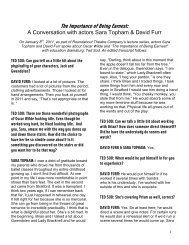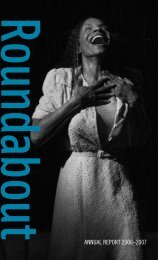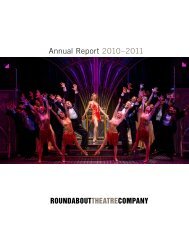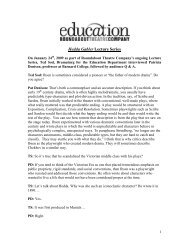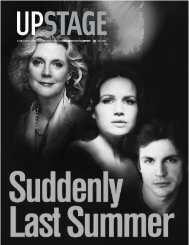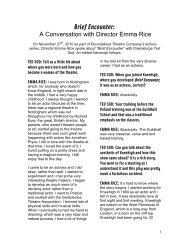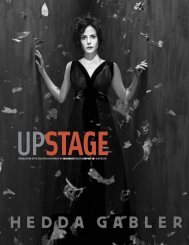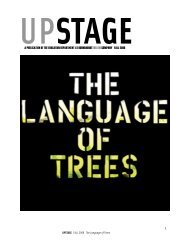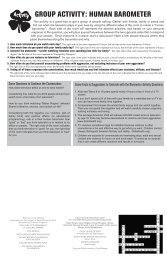Les Liaisons Dangereuses - Roundabout Theatre Company
Les Liaisons Dangereuses - Roundabout Theatre Company
Les Liaisons Dangereuses - Roundabout Theatre Company
You also want an ePaper? Increase the reach of your titles
YUMPU automatically turns print PDFs into web optimized ePapers that Google loves.
UPSTAGE<br />
A Publication of the Education Department at <strong>Roundabout</strong><strong>Theatre</strong><strong>Company</strong> UP SPRING 2008
Devotion–Profound dedication,<br />
as to a person or principle.<br />
“Long phrases were not required to establish the fact that, when each of us<br />
possesses all that is necessary to ruin the other, we have a like interest in mutual<br />
consideration: there is no question, therefore, of that. But, between the violent<br />
course of destroying one another, and that, doubtless the better, of remaining<br />
united as we have been, of becoming even more so by resuming our old liaison;<br />
between these two courses, I say, there are a thousand others to adopt. It was not<br />
ridiculous, therefore, to tell you, nor is it to repeat, that from this day forward I will<br />
be either your lover or your enemy.”<br />
–The Vicomte de Valmont to the Marquise de Merteuil, Letter 153<br />
Choderlos de Laclos, <strong>Les</strong> <strong>Liaisons</strong> <strong>Dangereuses</strong>
4<br />
Devotion to Directing:<br />
Rufus Norris<br />
6<br />
Devotion to Acting:<br />
Laura Linney<br />
8<br />
Devotion to History:<br />
The World of the Play<br />
10<br />
Devotion to Design:<br />
Katrina Lindsay<br />
12<br />
Devotion to Combat:<br />
Rick Sordelet<br />
14<br />
Devotion to Language:<br />
Christopher Hampton and the<br />
Language of the Play<br />
upstage CONTRIBUTORS: David A. Miller Director of Education; Reneé Flemings Director of Instruction and<br />
Curriculum Development; Ted Sod Education Dramaturg; Jennifer DiBella Education Program Manager;<br />
Jay Gerlach Education Associate for <strong>Theatre</strong>-Based Programs; Amanda Hinkle Education Associate for School-<br />
Based Programs; Aliza Greenberg Education Assistant; Sara Curtin Education Intern; Steve Tarca Education<br />
Intern. COVER: Artwork for the <strong>Roundabout</strong> <strong>Theatre</strong> <strong>Company</strong> production of <strong>Les</strong> <strong>Liaisons</strong> <strong>Dangereuses</strong>.<br />
Copyright © 2008 <strong>Roundabout</strong> <strong>Theatre</strong> <strong>Company</strong>, Inc. All rights reserved.<br />
ROUNDABOUTTHEATRECOMPANY 231 West 39th Street, Suite 1200, New York, NY 10018 Telephone: 212.719.9393 Fax: 212.869.8817 www.roundabouttheatre.org.
UPSTAGE recently interviewed director Rufus Norris regarding his<br />
devotion to <strong>Les</strong> <strong>Liaisons</strong> <strong>Dangereuses</strong> and the collaborative process.<br />
Why did you want to direct this play?<br />
Todd Haimes approached me about it a while ago, and,<br />
at first, I thought well, I don’t know, but I’ll read it. It<br />
was one of those things. I read it, and it did that ‘thing.’<br />
It did that thing because it’s personal and it’s completely<br />
timely. It’s timely in that it speaks to all ages, really. It<br />
deals with obsessions such as greed, lust, power, wealth,<br />
and perversity. It’s a parable for our age as well because<br />
underneath it all there is a love story. For me, the play<br />
isn’t just about corrupt, nasty, rich people. It’s about<br />
what people do when they don’t get what they want or<br />
what they need, and also what happens when society<br />
will not allow you to be vulnerable. There was pressure<br />
on you to be “cool” or fashionable. We certainly know<br />
what that means in our society today. It felt and still<br />
feels pertinent.<br />
How did you prepare yourself to enter the<br />
world of pre-revolutionary France?<br />
I have a pretty thorough grasp of European history and<br />
classical music. It’s great fun and doesn’t feel like work<br />
when you’re researching that stuff. Usually, there’s<br />
always a strong way into a particular work for me. I<br />
like to listen to all the composers of the period. That<br />
immediately got me researching some of the costume<br />
stuff. It’s actually opened my eyes to something. They<br />
are so physically restricted in what they’re wearing;<br />
it’s like if you squeeze something, it comes out more<br />
forcedly and that is all they have because everything<br />
else is so restricted. They can’t express themselves<br />
physically in what we consider to be a normal way.<br />
Their small gestures then become sharper and have<br />
great significance. It’s interesting you use the phrase<br />
“the world.” When you go see a piece of theatre, it’s<br />
about creating a complete world, which the audience<br />
comes into and the world includes spoken word, visual<br />
language, and music.<br />
What do you look for in the collaborators for a<br />
production?<br />
It is very specific to the demands of the play. It is a<br />
fantastically difficult text, so you need stage actors who<br />
are really comfortable on stage. It’s so different. They<br />
have to have breath control and project because it’s not<br />
a small theatre. They have to fire it to the back of the<br />
theatre so that everybody can hear every word. That<br />
is a huge skill, and it’s a skill which some actors have<br />
more than others. Beyond that, it depends on the part<br />
and what you look for in an actor. It’s very important<br />
to me that they are nice people. People should be nice<br />
and have a good time. I don’t have time for conflict in<br />
the work. I’m a complete believer in being productive. If<br />
you empower people then they’ll get vulnerable for you,<br />
which is what you want. You want them to open up. So,<br />
that’s what I want: actors who are incredibly skilled and<br />
who are nice.<br />
What about designers?<br />
Most good designers are very flexible. It’s about<br />
relationships, and sometimes, it’s a gamble if you are<br />
to work with someone new. I knew Scott’s work from<br />
London, and I’ve seen two or three of his shows. He<br />
answered the phone and said yes right then and there,<br />
so that was very quick. I’ve only worked with about<br />
two set designers in the last ten years. It’s almost always<br />
been the same two in England, so to work with someone<br />
completely new was scary. That’s partly why I was so<br />
keen to have Katrina on board as costume designer,<br />
because I’ve worked on 18 or 19 shows with her. To<br />
me, that’s the perfect balance: to have somebody who is<br />
obviously excellent but you haven’t worked with before,<br />
and to have somebody who is excellent and have had a<br />
long relationship with. She’s also a wonderful costume<br />
designer, and to have a European costume designer on<br />
a distinctly European show makes a certain amount<br />
of sense. Everyone can look in a book, but she has got<br />
slightly her own view of it.<br />
Did you read Laclos’ book or see any of the<br />
movie adaptations? Were they valuable to<br />
you?<br />
Actually, I’ve only read the book recently, and I had<br />
never seen the play. I think the show was cast before I<br />
even saw the movie adaptation of the play. I had seen<br />
no version of it until I had already done a whole load of<br />
preparation. I’ve had Cruel Intentions sitting on my desk<br />
at home meaning to watch it but somehow I never have.<br />
I kind of trust those things. If you don’t get around to<br />
something, there’s usually a reason why. It just keeps<br />
you clear. I’m glad I saw the film because there are<br />
actually one or two ideas which are nice to pinch. I have<br />
no shame about stealing stuff.<br />
4 ROUNDABOUTTHEATRECOMPANY
Is the idea that the book and play might be<br />
about a cultural decadence important to you or<br />
to this production?<br />
Absolutely, to understand the decadence of that<br />
culture and the perils of vanity and greed is essential.<br />
There should be the sense at the end that their time is<br />
up. Their society is heading to the chop. It’s about to<br />
collapse. It’s important as a warning of extreme human<br />
behavior that’s about to be cut off.<br />
Do you see a parallel between the play and<br />
contemporary times?<br />
There is a separation from the effects that your actions<br />
have on other people, and the extreme racism, which<br />
was more extreme because they believed in the blue<br />
blood connection to God and the royal family. In that<br />
society, the vast majority of people were poor. In the<br />
United States, that’s not true. There are reasons why<br />
people go, “yeah, well, whatever.” It’s because it’s not<br />
actually hitting them in such a way. It’s not making their<br />
lives worse. There are places in the states where people<br />
are affected, like New Orleans. Of course it will. It’s just<br />
the power isn’t there. It’s the same in Britain. We can<br />
complain and march about, “Don’t go to war.” Unless<br />
they’ve been affected on a personal level, they get back<br />
to business the next day or even later the same day.<br />
You talked about this being a love story. Do<br />
you see Merteuil and Valmont as being in<br />
love?<br />
They’re not in love in with each other. She’s in love<br />
with him, and he’s in love with himself. It goes wrong<br />
when he falls in love with Trouvel. This is why Merteuil<br />
destroys him. While he’s in love with himself, she can<br />
control him, even if she can’t have him. However, when<br />
he falls in love with someone else, that’s not acceptable<br />
to Merteuil. She destroys both he and Trouvel in the<br />
process. The fact that these people just did it for pure<br />
fun is not interesting to me and it’s not what Chris<br />
Hampton has written. I don’t know to what degree he’s<br />
invented the love story but it’s definitely in there. People<br />
behave terribly, but in their own eyes it’s justified. They<br />
find a way of justifying it. I think my job as a storyteller<br />
is to absolutely sympathize with every character in the<br />
piece. Otherwise we would be just painting Merteuil<br />
as the Cruella de Ville. Well, it’s more than that, and<br />
our actress is much more than that. Valmont has to be<br />
just more than some devil. He’s a seducer. How do you<br />
seduce? You seduce by charming. How do you charm?<br />
By making people feel alive when you’re with them.<br />
He makes people feel alive. Chris Hampton has made<br />
it more of a human story, and I’m not intending for a<br />
second to back away from that. You need to watch what<br />
they’re doing and understand their relish whilst you<br />
despise. You need to laugh and then go, “Oh no, why did<br />
I find that funny?”<br />
What advice would you give to a young<br />
person who is considering becoming a<br />
director?<br />
It’s very different these days from when I started. I’d<br />
say be aware of two things: one is that everything you<br />
do in the theatre is related to it. When I was a kid, I<br />
operated the follow spot which means that as a director,<br />
I understand what a follow spot operator does. That<br />
means that I get along with them, so they spot better for<br />
me. You can use everything that you’ve done or learned,<br />
so do and learn different things. It will all relate. The<br />
second good thing is that you cannot blame anyone,<br />
ever. It’s always your fault. That is a terrifically liberating<br />
thing. The first thing to do is to get used to that. Just<br />
start working. You can do that in lots of different ways.<br />
Don’t wait for the big job that millions of people are<br />
applying for. Sure, apply for them, but you want to make<br />
your mistakes in small places. You want to continually<br />
learn. I was blessed and I found a little fringe theatre<br />
where I did a few shows there before any national papers<br />
came anywhere near me. The first time I got a national<br />
review in a paper I had already done several shows. It’s<br />
hard. You’ve got to have time. You’ve got to have time to<br />
think, get together with your mates and somehow start<br />
doing it. Assisting is useful up to a certain point, but you<br />
learn how to direct by directing and not by watching<br />
other people direct. &<br />
UPSTAGE spring 2008 <strong>Les</strong> <strong>Liaisons</strong> <strong>Dangereuses</strong> 5
Acting<br />
Three-time Academy Award nominee Laura Linney devoted some<br />
time with UPSTAGE to talk about the art of acting through<br />
different styles and mediums.<br />
I wanted to start by asking you why you<br />
wanted this role.<br />
It wasn’t that I wanted to play the role: it’s that I wanted<br />
to be in the play. I’ve always loved this play. I had<br />
seen the famous fantastic first production by Howie<br />
Davies which I believe was in 1984, and it had a huge<br />
impact on everyone who saw it. It’s always been in my<br />
consciousness of what I think is great theatre.<br />
The play obviously has resonance for you. Is<br />
that personal resonance?<br />
No, I’m just more impressed with it as a piece of drama<br />
more than anything. I’m most impressed with the<br />
language and the architecture of the play, Christopher<br />
Hampton’s adaptation and all of his work, and the<br />
challenge that it takes to pull it off.<br />
Did you find reading the novel helpful in your<br />
preparations for this production?<br />
Sure, absolutely. Primary resources are always a good<br />
thing. You have to sort of leave it, but you can use it for<br />
reference or maybe to find a clue here and there.<br />
Can we talk a little bit about process, what is<br />
the first thing you do?<br />
Read the play. A lot. Read it and read it and read it.<br />
Is it complicated doing a play with language<br />
like this after doing contemporary work? Do<br />
you have to shift gears somehow?<br />
It certainly is different technically. Fortunately, I’ve<br />
had experience with something like this before, but it<br />
does require a certain understanding of language, how<br />
it works and the most effective way to use it. You have<br />
to be able to decipher what the script and playwright<br />
are telling you through the use of language concerning<br />
thought, intention, behavior and physicality.<br />
Why does the Marquise behave the way she<br />
does?<br />
I’m still figuring it out. I hesitate to say one thing or<br />
another because tomorrow I might change my mind<br />
completely. She is wonderfully complicated. Even as<br />
devious, calculating and punishing as she is, you can<br />
easily see why a woman of this time period would<br />
behave in such a way. Let’s just say that she would be a<br />
terrific woman now. She’d be a CEO of a company or<br />
something.<br />
Can we talk a little bit about what you look for<br />
in a director?<br />
Hopefully they look for me. My job is to help them<br />
realize their production. It’s not the other way around.<br />
A director is a director and it’s their production and<br />
I’m there to help them put that production up. It’s not<br />
all about me. I enjoy working with different directors<br />
because they challenge and work you in different<br />
ways. Directors are insulated beings; they don’t work<br />
with each other. They are sort of their own country<br />
unto themselves, and when you work with different<br />
people you collect different ways of working. It’s good<br />
to stretch and push yourself. Some directors are far<br />
more intellectual, some are purely instinctive, some are<br />
emotional, some are theatrical, and some are realistic.<br />
It’s always fun because you never know what’s around<br />
the corner.<br />
Can we talk a little bit about the difference<br />
between working onstage and in film?<br />
Sure, there is a huge difference. Your job is different. It<br />
took me a while to figure out what my job was in film<br />
because I had grown up in the theatre and understood<br />
this world. I realized that it was unfair of me to try to<br />
apply the rules of theatre onto the world of film. I think<br />
a lot of people can fall into that trap thinking, “this is<br />
what theatre is, this is what drama is, this is what acting<br />
is, and now I’m going to apply it to the world of film.”<br />
That’s not fair because the world of film is its own thing.<br />
You have to adapt and figure out what you can take<br />
from theatre that is useful to you in film. At times you<br />
have to completely jettison because it will just get you in<br />
trouble. I think of it as though they are both sports, but<br />
it’s like tennis and swimming.<br />
6 ROUNDABOUTTHEATRECOMPANY
Different muscles.<br />
Completely.<br />
Film is usually out of sequence too. Do you<br />
have to be sure of where you are at in the<br />
film?<br />
Yes, absolutely. What theatre has that makes the<br />
experience so meaningful is time. There are certain<br />
things that you cannot force: you can’t create what time<br />
provides between people or your own relationship with<br />
the play. Those relationships deepen and your comfort<br />
with the language becomes more intense as time goes<br />
by. You cannot rush that process. That’s something that<br />
you just earn. In film you don’t have that. In film, you<br />
do a scene and then it’s over and bye-bye. You never do<br />
it again. It’s immediate. But there’s something about<br />
the wonderful stewing, the hibernation of thought and<br />
feeling and how week after week after week goes by,<br />
things become more meaningful.<br />
Do you have a preference?<br />
No, not anymore. I used to. The theatre is the theatre. I<br />
love them both and I’m very relieved and I believe that<br />
film work makes theatre work better and theatre work<br />
makes film work better.<br />
What advice would you give to a young<br />
person who wants to pursue a career in<br />
acting?<br />
It’s different for everybody. You have to be very honest<br />
about what you want so that you don’t waste time.<br />
It can change, and you also need to give yourself the<br />
permission to change it. For me, I was very lucky<br />
because I knew what I wanted quite early. I wanted a life<br />
in the theatre and I also knew, thankfully, that I needed<br />
to be trained to do that. So I went to school for a long,<br />
long time. I went to college and was a theatre arts major<br />
in college and then went on and was trained at Julliard,<br />
which was a four year program. So I didn’t get out of<br />
school until I was 26.<br />
Were you inspired by your father being a<br />
playwright?<br />
I’m sure that had something to do with it. But I also feel<br />
like it’s very much mine. It certainly helped introduce<br />
me to the theatre, without a doubt, and he’s fantastic to<br />
use as a resource to go and ask questions about a certain<br />
playwright or what is dramatic within a scene. However,<br />
on the whole really I feel like it’s my own life, although<br />
the fact that they’re connected is nice. &<br />
Gregg DeGuire Wireimage<br />
UPSTAGE spring 2008 <strong>Les</strong> <strong>Liaisons</strong> <strong>Dangereuses</strong> 7
History<br />
Eighteenth Century Pre-Revolutionary France<br />
The 18th century is credited as the Age of the Enlightenment, the time when thinkers began to contemplate the<br />
responsibilities of the individual as he or she relates to society, the state, and the world. The roles of the individual<br />
were considered through reason and logic. The Age of the Enlightenment received its name because it was considered<br />
to be the first time since the Renaissance that reason, logic, and creativity were reborn after generations of dormancy.<br />
Popular ideals such as socialism, democracy, and capitalism arose during this time providing a proper state of mind<br />
for revolution.<br />
Louis XIV, Louis XV, and the growing frustrations of the<br />
lower class :<br />
The Enlightenment had a political impact as early as Louis XIV’s<br />
reign, when the feudal system began to weaken, and his system of<br />
a centralized state of absolute monarchy was replaced. As royalty<br />
spending increased, so did taxation and land reform, angering<br />
peasantry. Under the reign, Louis XV attempts to rectify problems<br />
with taxation, land, and the growing divide between the rich and<br />
poor proved inadequate, too little, and too late. Additionally, his<br />
failed wars with Austria, Poland, Britain, and Canada compounded<br />
debt exponentially.<br />
Louis XV’s efforts at being perceived as the gentle monarch failed<br />
as well. Influenced by a movement called Enlightened Despotism,<br />
Louis XV tried to both reinforce the power of the monarchy and<br />
provide reform for the growing discontent of the lower class. In the<br />
end, Louis XV’s attempts failed due to the power of the aristocracy,<br />
which blocked his attempts at reform (Economic Origins of the<br />
French Revolution). Even moderates such as Jacques Necker,<br />
the finance director to the Louis XVI, were met with opposition<br />
while promoting reform. These events eventually resulted in his<br />
dismissal. His writings, particularly on the expenditures of the<br />
monarchy, brought their private extravagance under public scrutiny.<br />
The nobility’s unwillingness to communicate and the festering<br />
frustration of the plebian made the revolution an inevitable<br />
occurrence.<br />
1715 Louis XIV, the Sun King, dies.<br />
During his reign, much of the aristocracy<br />
of France gain power and prestige through<br />
his efforts at creating a centralized<br />
government. He also instates the absolute<br />
monarchy, which serves as a catalyst to<br />
both the Enlightenment and the French<br />
Revolution almost 100 years later. Louis<br />
XV, his great-grandson, is his successor.<br />
1763 The Treaty of Paris is signed,<br />
ending the seven years war between<br />
France, Prussia, Britain, Austria, and<br />
their colonies. As a result, France loses<br />
much of its colonial power and ends up<br />
amassing debt.<br />
1774 Louis XV dies after an unpopular<br />
reign. His expensive wars heighten the<br />
debt, resulting in higher taxes, which<br />
angers the French middle and lower<br />
classes. His grandson, Louis XVI,<br />
becomes the next king of France.<br />
1781 Jacques Necker, the previous<br />
finance director to the king, publishes<br />
the Compe Rendu au Roi (Report<br />
to the King) which highlights royal<br />
expenditures. For the first time in French<br />
history, the lower classes begin to take<br />
interest in government finance and the<br />
extravagance of the French aristocracy.<br />
8 ROUNDABOUTTHEATRECOMPANY
Choderlos de Laclos and the trajectory of <strong>Les</strong> <strong>Liaisons</strong> <strong>Dangereuses</strong>:<br />
In 1782, when Choderlos de Laclos published his epistolary novel <strong>Les</strong> <strong>Liaisons</strong><br />
<strong>Dangereuses</strong>, French society was at a crossroads. Years of taxation and growing debt<br />
angered the middle and lower French classes while the aristocracy sat comfortably at<br />
the top. Their boredom, decadence, and perversion are showcased throughout the<br />
original material.<br />
Choderlos de Laclos was born on October 18, 1741, in Amiens, France. He wrote<br />
a single novel and only a handful of poems and essays, including an unpublished<br />
essay on educating women. His family had modest wealth, due to his father’s role as<br />
a government official. While ennobled, his father did not have a title. His life was<br />
mainly comprised of military roles which began at the age of 19 when he became<br />
a pupil at the Royal Corps of Artillery. In 1763, when the Seven Years War had<br />
ended, Laclos lived in North-Eastern France where he had his first poem published.<br />
It is believed that in 1778 or 1779 Laclos began writing <strong>Les</strong> <strong>Liaisons</strong> <strong>Dangereuses</strong>,<br />
an epistolary novel, meaning it tells the story through a correspondence of letters.<br />
In April 1782, Laclos had 2000 copies of his novel published which sold out immediately and caused controversy<br />
throughout the French elite. While often viewed as a diatribe on aristocratic decadence and wealth, his relationships<br />
with the titled Duc d’Orleans, the cousin to Louis XVI, contests this claim. During the reign of terror started by<br />
Robespierre, he was arrested due to political fighting in 1793. Although expected to be guillotined, he was set free the<br />
following year. The next few years were spent unknown until 1800 when he was appointed artillery general under<br />
Napoleon Bonaparte. After spending another three years in the military, he died on September 5, 1803 in Italy.<br />
The War Begins :<br />
In the wake of the French Revolution, several additional events took<br />
place which added wood to the proverbial fire that was growing<br />
among the middle and lower classes. When King Louis XVI called<br />
together the Estates General, the first two estates, which only<br />
represented 15% of the population, received an equal share of votes<br />
as the third estate, which was made up the remaining 85%. This<br />
unfair representation of the Third Estate greatly angered the lower<br />
class. The third estate was eventually granted two votes due to their<br />
continued protests. As time went on, the third estate eventually<br />
separated from the Estates-General and renamed their estate the<br />
National Assembly. Almost one month later, the storming of the<br />
Bastille served as a symbolic act against the French monarchy<br />
which prompted following events such as the beheading of Marie<br />
Antionette and Louis XVI, as well as the creation of the Declaration<br />
of the Rights of Man. &<br />
24 January 1789 The Estates-<br />
General, comprised of three sections<br />
(the clergy, the nobility, and the lower<br />
class) is summoned for the first time<br />
in almost 200 years in order to approve<br />
a new tax plan. During this time, the<br />
growing contempt of the lower class<br />
towards the aristocracy becomes very<br />
apparent.<br />
June 1789 The Third Estate, also<br />
knows as the commons, meets separately<br />
from the clergy and nobility and names<br />
themselves the National Assembly. This<br />
act of revolution causes them to be locked<br />
out of their chamber by royal decree. They<br />
meet in a nearby tennis court where they<br />
take the Tennis Court Oath, swearing that<br />
the Assembly will not dissolve due to royal<br />
decree. This is a revolutionary and brazen<br />
act against the king.<br />
14 July 1789 The fall of the Bastille<br />
and the Start of the French Revolution.<br />
Although only seven people were housed<br />
in this jail, its capture is a significant<br />
symbol and action against the French<br />
monarchy and signals the start of the<br />
French Revolution.<br />
26 August 1789 The Declaration<br />
of the Rights of Man is approved by the<br />
National Assembly. This is the first step<br />
at a democratic state and constitution by<br />
the people of France.<br />
UPSTAGE spring 2008 <strong>Les</strong> <strong>Liaisons</strong> <strong>Dangereuses</strong> 9
esign<br />
Costume designer Katrina Lindsay talked to UPSTAGE about the<br />
creative challenges of <strong>Les</strong> <strong>Liaisons</strong> <strong>Dangereuses</strong> and her devotion<br />
to the design process.<br />
Joan Marcus<br />
How do you approach this play as a designer?<br />
Well, it’s definitely about keeping it within the period.<br />
It’s quite an elaborate period, so you have to find ways<br />
of scaling that down so that it becomes manageable.<br />
Also you need to have some sort of world to it that<br />
is united. It’s different than if you were doing a film<br />
where you can constantly change costumes and set. You<br />
have to find a common language that works as well on<br />
stage. I’ve had to pare it down to a certain amount of<br />
costumes and create a logic to that. My solution has<br />
been to make it about silhouettes and about a very clean<br />
palette of color. I’ve tried to keep that taut and not too<br />
fussy. That was my approach to the piece.<br />
When you talk about colors, do you mean<br />
simple colors?<br />
18th Century colors: golds, purples and blues. They’re<br />
all quite similar. There’s not a huge contrast, although<br />
within the piece we get slightly more expressionistic as<br />
the façade begins to fall away from the people. Then we<br />
go with slightly stronger colors.<br />
What kind of research about the period did<br />
you have to do, seeing as how this occurs<br />
right before the French Revolution?<br />
The 18th Century is a wonderful period to do but it<br />
goes through quite a few different silhouettes, getting<br />
narrower in the 1780’s. I’ve mixed it a bit, but I’m<br />
using the narrower silhouette that you get just before<br />
the Revolution, which then went into the high-waisted<br />
shape.<br />
Is that uncomfortable for actors to wear?<br />
Only if you’re not used to wearing a corset. It’s great<br />
to be able to wear it during rehearsal in order to get<br />
your body acquainted with what you can and can’t<br />
do. The women have to be careful about how they<br />
negotiate sitting because of the hoop pannier and some<br />
backbones.<br />
Are the fashions influenced by Marie<br />
Antoinette and her husband?<br />
The court was a great influence, especially for the<br />
aristocratic, the rich, and the wealthier people. A lot<br />
of the fashion was based on court dress. Then again,<br />
towards the end of the century it starts to become<br />
10 ROUNDABOUTTHEATRECOMPANY
Joan Marcus<br />
simpler. They started using smaller prints rather than<br />
going for the big fabrics. As industrial products started<br />
changing, they were plating different types of fabrics.<br />
Stripes started coming through a bit more, as well.<br />
Were the French at the vanguard of fashion<br />
at this point, or were they influenced by other<br />
cultures?<br />
France was definitely a very fashionable place. England<br />
was much plainer with more cotton fabrics as opposed<br />
to the French with the silks.<br />
How do you collaborate with a director?<br />
We read the script, had our thoughts on it, and talked<br />
about the world of it as well as the way the production<br />
might develop. Then we went through it literally scene<br />
by scene. We gave plots for each character and talked<br />
about where they would possibly change or where there<br />
might be a bridge. There are also a lot of layers to the<br />
clothes and quick changes have to be looked at carefully.<br />
In the 18th century, it could take them up to four hours<br />
to prepare for the day with all their underpinnings,<br />
corsets and powdered wigs, yet we have to change items<br />
within minutes in the theatre. That was a huge part of<br />
the daily life of these people and it takes time to work<br />
this out on stage.<br />
You’re working with Paul Huntley on the wigs,<br />
how do you collaborate with him and the<br />
other designers in terms of how it’s going to<br />
look?<br />
We’ve talked about the kinds of wigs we’re thinking of<br />
using. It’s not going to be the massive, big ones. They’re<br />
much more human, but slightly powdered so it still has<br />
the right sense of period. The style of wigs was getting<br />
smaller at this point as well. Then, we’ll choose color,<br />
make it up and work through that.<br />
And lighting will become an important issue,<br />
as well.<br />
Yes. It will change everything! And there is a reflective<br />
surface.<br />
Could you tell us about where you studied?<br />
I went to Central Saint Martins School of Art and<br />
Design and studied theatre design there. A lot of the<br />
time when I am in Britain I do both set and costume.<br />
That’s how it works there.<br />
What advice do you give to someone who<br />
says, “I want to be a costumer?”<br />
I think it’s really important with costumes that you<br />
understand character and enjoy the actor’s process.<br />
They’re the people who have got to wear it. If they’re<br />
awkward in something that you create, it’s not going to<br />
work at all for anybody. I think there has to be a basic<br />
love of storytelling and character and then for how you<br />
express that visually. I think that should be a starting<br />
point. Obviously, if you love clothes and the detail of<br />
period costumes that’s an extra bonus. &<br />
UPSTAGE spring 2008 <strong>Les</strong> <strong>Liaisons</strong> <strong>Dangereuses</strong> 11
UPSTAGE recently sat down with fight choreographer Rick<br />
Sordelet to discuss the art of stage combat and his devotion<br />
to the craft.<br />
Can you tell me a little bit about how you<br />
begin to approach the work that you need to<br />
do on this particular show.<br />
The key thing is to talk to the director because<br />
everything that happens will come from the director’s<br />
vision. I read the play, then I have a conversation with<br />
the director, and then the director and I will go through<br />
everything. I’ll learn what his ideas are and what he<br />
wants the tonality of the piece to be, psychologically<br />
where are we, what’s going on with the characters, and<br />
why they have chosen to fight. In the case of <strong>Les</strong> <strong>Liaisons</strong>,<br />
they’re living in a world where it was appropriate to<br />
actually have a duel.<br />
At the time, was this common for two men to<br />
duel over a woman?<br />
Well, it’s not as simple as just a woman: it’s also honor.<br />
Valmont and the Marquise have been manipulating<br />
everybody, and it has gotten to the point where no one<br />
can tolerate this behavior anymore. So now this young<br />
man has said “You have besmirched my character and<br />
my honor and this woman’s character and her honor,<br />
and we’re going to fight.”<br />
Was it expected as part of a young man’s<br />
training to learn to fence?<br />
It’s very difficult in some ways for an audience to wrap<br />
their head around what was considered appropriate<br />
during that day. 200 years from now, people will<br />
probably look at our lifestyle and become completely<br />
aghast at how barbaric we were. However, during that<br />
day and age it was appropriate for a young man to learn<br />
dancing as well as fencing because it helped him move<br />
in social circles. The more refined you were, the more<br />
you could move within those social circles. The poor<br />
people couldn’t learn dancing or fencing because they<br />
were too busy working. The rich didn’t want the poor<br />
to learn dancing or fencing because then they would be<br />
elevated to their circle. I guess nowadays, it would be<br />
considered like a country club.<br />
Does the director determine how long the<br />
fight will last?<br />
You know, I never plan how long a fight is going to take.<br />
I’ve had directors say, “I want the fight to be exactly<br />
twenty-three seconds,” or, “I want the fight to be two<br />
minutes and thirty-two seconds.” And you’re like, “Okay.<br />
Why?” They’ll say, “Well that’s how much time I have in<br />
the play and that’s how much time I’ll give you.” To me,<br />
the fight needs to last as long as long as it takes. It’s like<br />
a good scene or good dialogue. No playwright sits down<br />
and says, “I will write a play that is exactly 2 hours long.”<br />
You might cut things or add things to reach two hours,<br />
but you don’t start off with that. With the fight, we’ll<br />
have one that’s just as long as it needs to be in order to<br />
tell the story. Rufus is the kind of director who is very<br />
comfortable and confident within himself, and he is<br />
not under any kind of pressure to have the fight be any<br />
more or less than what the story needs.<br />
So tell me something about these two<br />
gentlemen that you’ll be working with, do<br />
they have any training with this?<br />
Holy mackerel! I am so happy. It’s really rare that a<br />
fight director gets fighters who know how to fight. Ben,<br />
the American - we called them Ben A. (the American)<br />
and Ben B. (the Brit) - is a fellow that I worked with at<br />
Williamstown a few years ago and he played Mercutio.<br />
He was fantastic. He is one of the top Mercutios I have<br />
ever worked with, and I’ve done seventy-one so far. He<br />
is a fantastic actor. Coupled together, you get a great<br />
storyteller who knows how to fight.<br />
Is he Danceny or Valmont?<br />
Danceny. We’ve also got Valmont who came in, picked<br />
up the sword and just went to it like a duck to water.<br />
When I was teaching him sword fighting, he asked a<br />
very important question: “When would I carry?” That<br />
means to block the other man’s sword. He said, “I don’t<br />
think I would carry this until I know for sure he’s going<br />
to cut.” What that told me was, here is an actor who<br />
really understands his craft. He knows that a swordfight<br />
looks best when it looks like it’s happening for the first<br />
time, and so already, at the very first lesson, he started<br />
working like that, which usually doesn’t happen.<br />
How much time do you spend with them?<br />
We try to spend about an hour or so, and they’re<br />
learning what we’re calling the “vocabulary” now. The<br />
particular sword we’re using is called a small sword. It<br />
was developed after the invention of gunpowder, so it’s<br />
12 ROUNDABOUTTHEATRECOMPANY
a very light sword. It looks like a fencing epee, and it’s<br />
all about point work. It has a needle sharp point and it’s<br />
designed for really just thrusting or poking your partner<br />
in the chest. There are really no cuts involved in this. It’s<br />
the closest relative to modern day fencing.<br />
When you engage in a duel the goal is to kill<br />
the opponent, right?<br />
It depends on the rules that you set up. If I were<br />
offended by somebody, I might say to them, “Well,<br />
we will fight to first blood, and first blood will receive<br />
satisfaction.” I might stab him in the arm or stab him<br />
in the thigh and because I drew first blood, I received<br />
my satisfaction. I did not need his life to be taken. If the<br />
argument or the question of honor is very intense, one<br />
of the fellows might say, “Well, you know first blood<br />
is not enough. It has to be to the death.” And so they<br />
would fence to the death. You would show up with what<br />
are called “seconds.” My best friend would come with<br />
me and his best friend would come with him, and their<br />
job is to keep other people out so that nobody can join<br />
in. If I was stabbed and couldn’t stand up anymore, my<br />
second would come over and say “Rick is grievously<br />
wounded and can no longer fight. Will you accept the<br />
fact that he can no longer fight and will your honor be<br />
satisfied?” In which case he might say “Yes my honor is<br />
satisfied and we’re done,” or he might say, “No. When<br />
he is recovered, if he recovers, we will continue.” Then<br />
the duel would continue when the other partner was<br />
recovered and could stand and fight again. That might<br />
take years.<br />
that you go apply for; it’s a job you have to cultivate<br />
and create. It takes a lot of work to do it and I’ve had<br />
many experiences which enable me to do this work. I<br />
come to this work as a classically trained actor from<br />
Rutgers University with William Esper. I have an<br />
extensive background in martial arts, and I fenced for<br />
Wisconsin for four years on their fencing team. There<br />
is also a great deal of dance in my background. You also<br />
have to approach a show saying, “Okay, what I want to<br />
do is tell the story that the director has created.” For<br />
instance, if we were doing Hamlet and the director has<br />
a particular concept that he wants to follow, it would be<br />
inappropriate of me to try and do the Hamlet that I had<br />
done before. My advice is, if you want to be a carpenter<br />
or a maker of fine furniture, the first step you better take<br />
is learn how to construct things so they don’t fall down.<br />
Anything else you want to say about the play<br />
or your work?<br />
The thing that is so exciting about this particular play is<br />
that it shows a period of time where this was considered<br />
an art. Everything was done unfortunately in precept; you<br />
lived on your reputation and so your reputation was what<br />
you fought for. If someone called you a liar, and then you<br />
did nothing about it, then you were considered a liar.<br />
That’s why it is so important to defend your reputation<br />
during that time period, and that’s why it makes it such<br />
an interesting era because you were on your own. You<br />
had no army of public relations people working for you:<br />
someone like Paris Hilton could never have survived back<br />
then the way she has to survive now. &<br />
How would you advise a student who was<br />
interested in doing this as a career?<br />
The very first thing is to learn how to tell a story with<br />
your mouth, your body, and your mind. It’s not a job<br />
UPSTAGE spring 2008 <strong>Les</strong> <strong>Liaisons</strong> <strong>Dangereuses</strong> 13
Language<br />
Christopher Hampton, born January 26, 1946, is a world-renowned<br />
playwright and screen writer. As a young child, Hampton moved<br />
around a lot, as his father worked with a British telecommunication<br />
company. After his birth in the Azores, he later moved to Aden and<br />
Egypt and eventually made his way back to England where he ended<br />
up studying. At the Lancing School where he lived, he studied with<br />
Tim Rice and David Hare. His vacations brought him to foreign<br />
locations such as Zanzibar and Hong Kong. His first play, When Did<br />
You Last See My Mother?, was produced when he was in Oxford at the<br />
Royal Court <strong>Theatre</strong>, where he would be resident playwright for two<br />
years in the late sixties. After studying at New College, Oxford as a<br />
Sacher Scholar studying German and French, Hampton became the<br />
youngest playwright to ever be produced on the West End in 1966.<br />
Christopher Hampton has had a long relationship with <strong>Les</strong> <strong>Liaisons</strong><br />
<strong>Dangereuses</strong> and had it in mind several years before it was finally<br />
produced. He says, “I got the idea to make a play of it [in 1976] when the National was moving into its new home on<br />
the South Bank. I proposed <strong>Les</strong> <strong>Liaisons</strong> <strong>Dangereuses</strong>. In the end, they didn’t want it, and I ended up doing Tales from<br />
the Vienna Woods. Then in 1984 the RSC (Royal Shakespeare <strong>Company</strong>) asked me to do a play, and so I offered <strong>Liaisons</strong><br />
to them. Howard Davies [the director] started reading the book and couldn’t get through it! But we ended up doing it<br />
all the same” (An Old Liaison).<br />
His plays include Total Eclipse (1967), The Philanthropist (1969), Savages (1974), Treats (1975), <strong>Les</strong> <strong>Liaisons</strong> <strong>Dangereuses</strong><br />
(1985) and the book to the Andrew Lloyd Webber musical Sunset Boulevard (1994), for which he won a Tony award.<br />
Hampton has also had a distinguished screenwriting career spanning over 35 years. His screenplays include A Doll’s<br />
House (1973), Dangerous <strong>Liaisons</strong> (1988), for which he won an Oscar, Mary Reilly (1996), The Secret Agent (1996), The<br />
Quiet American (2002), and most recently was Oscar-nominated for his screenplay Atonement (2007).<br />
VOCABULARY<br />
Joan Marcus<br />
French Pronunciation:<br />
<strong>Les</strong> <strong>Liaisons</strong> <strong>Dangereuses</strong> (ley lee AY zohng dahng<br />
zheh ruuz)<br />
Cholderlos de Laclos (SHOLL der loh duu laa KLOH)<br />
Madame de Volanges (muh DAM duu voh<br />
LAHNGZH)<br />
Cecile de Volanges ( suh SEEL duu voh LAHNGZH)<br />
Madame de Rosemonde ( muh DAM duu ROSE<br />
MOND)<br />
Madame de Tourvel (muh DAM duu tooor VELL)<br />
Azolan (AAZ oh LAN)<br />
Emilie (EHH mih lee)<br />
14 ROUNDABOUTTHEATRECOMPANY
French Titles:<br />
Le Vicomte de Valmont (luu VEE kohng duu val<br />
MAHNG): Member of the French European nobility,<br />
about the English equivalent of a Count<br />
La Marquise de Mertueil (lah mar KEEZ duu mer<br />
TOY): Member of the French European nobility,<br />
directly below a duchess<br />
Chevalier Danceny (shuh VAHL yay DAHN suh<br />
nee): Member of the French European nobility, the<br />
English equivalent of a knight<br />
Major-domo (MAY jer DOH moh ): The highest<br />
(major) of the household staff (domo)<br />
Chasseur (shaa SURR): French term for hunter given<br />
to light infantry divisions<br />
Valet de chamber (vaa LEY duu SHAHMbr): A<br />
personal attendant to his or her employer<br />
Monsieur (m’SYERRR): Originally meant “my lord,”<br />
but now generally means mister or sir.<br />
Madamemoiselle (MAD mwah ZELL) : French<br />
equivalent of Miss, usually for young ladies<br />
Joan Marcus<br />
Other Vocabulary heard in <strong>Les</strong> <strong>Liaisons</strong><br />
<strong>Dangereuses</strong><br />
Lugubrious: sorrowful, gloomy<br />
Paradox: a contradictory statement<br />
Chivalry: gallantry, often associated with knights who<br />
would honor women<br />
Depravity: wickedness and corruption<br />
Sadism: the act of deriving pleasure from the pain of<br />
others<br />
Languor: lack of energy, fatigue<br />
Decadence: luxurious self indulgence leading to<br />
deterioration or decay<br />
Libertine: one who acts without moral or sexual<br />
restraint<br />
Reticent: quiet, reserved<br />
Libertinism: the belief of acting without moral or<br />
sexual restraint<br />
Dilatory: procrastinating or delay<br />
Mawkish: sickly sentimental, sappy, or maudlin<br />
Joan Marcus<br />
Resources<br />
Greenlaw, Ralph M. The Social Origins of the French Revolution. Lexington, Massachusetts, Toronto, London: D.C<br />
Heath & <strong>Company</strong>, 1975.<br />
Hunt, Lynn. Politics, Culture & Class in the French Revolution. Berkeley, Los Angeles, London: University of<br />
California Press, 2004.<br />
Langton, Robert Gore. “An Old Liaison.” Plays and Players. October 1986: 12-13.<br />
Soboul, Albert. A Short History of the French Revolution. Berkeley, Los Angeles, London: University of California<br />
Press, 1968.<br />
Sonenscher, Michael. Before the Deluge: Public Debt, Inequality, and the Intellectual Origins of the French<br />
Revolution. Princeton, Oxford: Princeton University Press, 2007.<br />
Tackett, Timothy. Religion, Revolution, & Regional Culture in Eighteenth Century France. Princeton & Oxford:<br />
Princeton University Press, 1986.<br />
Temple, Nora. The Road to 1789: From Reform to Revolution in France. Cardiff, Wales: University of Wales Press,<br />
1992.<br />
Tocqueville, Alexis de. The Old Regime & the Revolution. Chicago, London: University of Chicago Press, 1998.<br />
UPSTAGE spring 2008 <strong>Les</strong> <strong>Liaisons</strong> <strong>Dangereuses</strong> 15
When you get to the theatre...<br />
below are some helpful tips for making your theatre-going experience more enjoyable.<br />
Ticket Policy<br />
As a student participant in Producing Partners,<br />
Page To Stage or <strong>Theatre</strong> Access, you<br />
will receive a discounted ticket to the show<br />
from your teacher on the day of the performance.<br />
You will notice that the ticket indicates<br />
the section, row and number of your<br />
assigned seat. When you show your ticket<br />
to the usher inside the theatre, he or she will<br />
show you where your seat is located. These<br />
tickets are not transferable and you must sit<br />
in the seat assigned to you.<br />
Performance<br />
Date and Time<br />
Show Title<br />
Programs<br />
All the theatre patrons are provided with a<br />
program that includes information about the<br />
people who put the production together. In<br />
the “Who’s Who” section, for example, you<br />
can read about the actors’ roles in other<br />
plays and films, perhaps some you have already<br />
seen.<br />
Section<br />
Audience Etiquette<br />
As you watch the show please remember<br />
that the biggest difference between live<br />
theatre and a film is that the actors can see<br />
you and hear you and your behavior can<br />
affect their performance. They appreciate<br />
your applause and laughter, but can be<br />
easily distracted by people talking or getting<br />
up in the middle of the show. So please<br />
save your comments or need to use the rest<br />
room for intermission. Also, there is no food<br />
permitted in the theatre, no picture taking<br />
or recording of any kind, and if you have a<br />
cell phone, beeper, alarm watch or anything<br />
else that might make noise, please turn it off<br />
before the show begins.<br />
Seat<br />
Row<br />
<strong>Theatre</strong> Name<br />
and Location<br />
Price<br />
<strong>Roundabout</strong> <strong>Theatre</strong> <strong>Company</strong> gratefully acknowledges the following for their generous support<br />
of our education program:<br />
The Aeroflex Foundation<br />
American Airlines<br />
American <strong>Theatre</strong> Wing<br />
Axe-Houghton Foundation<br />
Rose M. Badgeley Residuary<br />
Charitable Trust<br />
Theodore H. Barth Foundation<br />
Books of Wonder<br />
The Center for Arts Education<br />
CIT<br />
Citi Foundation<br />
Con Edison<br />
The Council of the City of New York<br />
The Samuel and Rae Eckman<br />
Charitable Foundation<br />
The Heckscher Foundation for<br />
Children<br />
JPMorgan Chase<br />
City Council Member Oliver Koppel<br />
The McGraw-Hill Companies<br />
Mellam Family Foundation<br />
Merrill Lynch & Co. Foundation, Inc.<br />
Newman’s Own Foundation, Inc.<br />
New Visions for Public Schools<br />
New York State Council on the Arts<br />
The New York Times <strong>Company</strong><br />
Foundation<br />
The George A. Ohl, Jr. Trust<br />
One World Fund<br />
The Picower Foundation<br />
Richmond County Savings<br />
Foundation<br />
The Rudin Foundation<br />
Adolph and Ruth Schnurmacher<br />
Foundation<br />
The Starr Foundation<br />
State of New York Department<br />
of State<br />
Time Warner, Inc.<br />
The Michael Tuch Foundation, Inc.<br />
Verizon Communications<br />
Walt Disney <strong>Company</strong><br />
Anonymous<br />
<strong>Roundabout</strong>’s page to stage program Generously supported by



